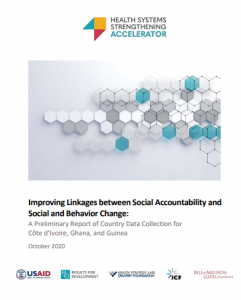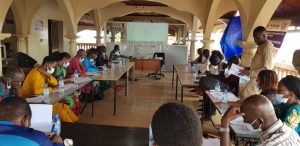Building Better Systems for Health Equity Using Social and Behavior Change
The Challenge
The USAID Vision for Health System Strengthening 2030 and the companion Learning Agenda identify social and behavior change (SBC) as a cross-cutting approach critical to strengthening health systems and striving for high-performing ones. In doing so, one goal is to expand thinking around where and how to cast a behavior change lens.
Health System Strengthening (HSS) programming often works in areas such as expanding the quality of and access to health services, health financial protection, health governance, health security, the advancement of universal health coverage (UHC), and other areas aiming to improve health systems and increase health equity. Applying a behavior change lens in each of these areas can yield important insights and inform programming.

Our Work
This activity focuses on specific themes and conceptualizations of programming innovations, with individual workstreams as noted below:
- Improving the Linkages between Social Accountability and Social and Behavior Change: Our team undertook a study—with data collection in Côte d’Ivoire, Ghana, and Guinea—to address the under considered linkage of social accountability (SA) and social and behavior change (SBC). In applying the results of this study, we work to identify and support promising opportunities for SA and SBC efforts to work together to increase health equity and efficiency through UHC.
- Awareness-Raising, Dissemination, Data Utilization, and Learning: After the release of our SA-SBC Linkages report, we discussed the findings with national-level stakeholders in Côte d’Ivoire, Ghana, and Guinea. In addition, we held data utilization and learning events at the sub-national level with a total of 263 participants across 8 districts joining these events. Focus on the sub-national level helped facilitate ways to bring in voices and perspectives that sometimes get left out when discussion occurs only in capital cities.
- Applying a Behavior Change Lens to Citizen Mobilization around UHC: The Accelerator facilitated two virtual workshops for the Togolese UHC Task Force and Civil Society Organizations. Participants applied a behavioral lens to assess engagement barriers for civil society and to design action items that were integrated into the national UHC workplan.
- Applying a Behavior Change Lens Budget Advocacy and the Community Health Strategy in Guinea: Through a collaborative process, the Accelerator is developing a SBC-oriented tool for citizen and civil society actors to inform budget advocacy work in relation to the community health budgeting process.
- HSS Practice Spotlight Briefs: The Accelerator is developing two briefs that will be part of the USAID/Office of Health Systems HSS Practice Spotlight Briefs. One brief will focus on the SA-SBC linkage and the other will focus on the role of SBC in financial protection interventions.
- Health Equity, HSS, SBC Case Study: The Accelerator is designing a case study to explore programming best practice around the nexus of Health Equity, HSS, SBC with focus on the following research questions:
- How do implementers conceptualize and define health equity?
- To what extent do projects undertake self-reflection around health equity as a learning and/or programming refinement exercise? What types of rubrics or tools have been used? What has been learned?
- In the context of individual projects, in what ways is a health equity lens informing HSS activities and vice versa? What is the “equity” in relation to?
- How (if at all) do projects integrate SBC into HSS activities? Or vice versa, do SBC activities measure changes in HSS and/or health equity related outcomes?
- In what types of situations might a behavioral change goal or metric, and/or social and behavior change approaches help to advance health equity-focused work within a project?
News
New Report Explores the Linkages Between Social Accountability and Social and Behavior Change
Authored by: Susan Pietrzyk, PhD, International Health and Development Team,...
Read MoreRESOURCES
- Presentation Slides in French: Improving the Linkages between Social Accountability and Social and Behavior Change (for National Level Stakeholders in Côte d’Ivoire)
- Presentation Slides in English: Improving the Linkages between Social Accountability and Social and Behavior Change (for National Level Stakeholders in Ghana)
- Presentation Slides in French: Improving the Linkages between Social Accountability and Social and Behavior Change (for National Level Stakeholders in Guinea)
- Event Recording in French: Improving the Linkages between Social Accountability and Social and Behavior Change (for National Level Stakeholders in Côte d’Ivoire)
- Event Recording in English: Improving the Linkages between Social Accountability and Social and Behavior Change (for National Level Stakeholders in Ghana)
- Event Recording in French: Improving the Linkages between Social Accountability and Social and Behavior Change (for National Level Stakeholders in Guinea)






